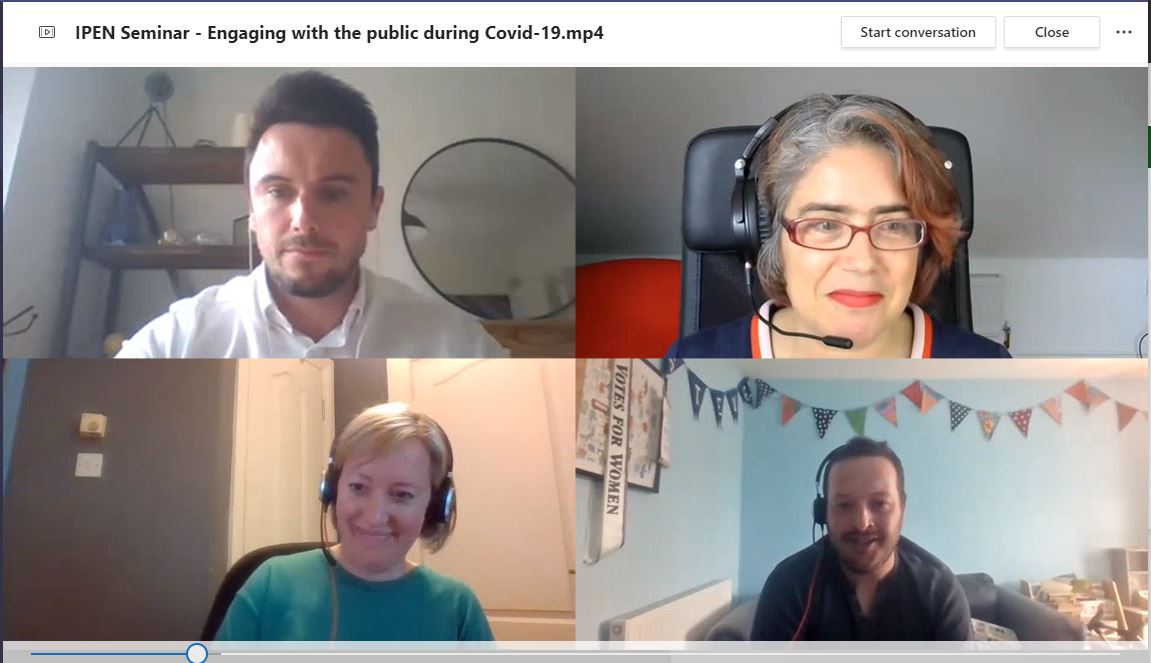Inaugurating IPEN seminar: public engagement during covid-19

Last week the International Parliament Engagement Network (IPEN) held its first online seminar, on engaging with the public during Covid-19. Alex Prior, one of CDE's Associate Members and a member of IPEN, gives us his reflections about the seminar.
The seminar was chaired by Cristina Leston-Bandeira, co-director of the Centre for Democratic Engagement. The seminar included talks with officials in the UK Parliament, Brazilian Senate, and Welsh Parliament. They spoke about their own experiences of working with the public during the pandemic, and the ways in which parliaments are adapting to the digital environment. The seminar was attended by 77 people logging in form as far as Alberta in Canada all the way to Adelaide in Australia.
Alisson Bruno, who co-ordinates the e-citizenship programme of the Brazilian Senate, pointed out that key areas of its work had remained consistent (since e-citizenship is already online). He observed that public participation was still having an impact, but that committees in the Senate were not currently meeting. This is problematic for e-citizenship tools such as Legislative Idea (through which citizens can suggest new laws for committees to debate) as citizens are still submitting ideas online (often relating to COVID-19). In order to effectively harness this citizen input, Alisson mentioned current recommendations for Senators to instead create new bills themselves, using input from Legislative Idea.
Emma McIntosh – Petitions and Engagement Manager for the Petitions Committee at the UK House of Commons – described the work of the Committee in overseeing petitions and improving scrutiny. Committees, as Emma attested, are still meeting, but their capacity to act on petitions has been reduced; for example, being unable to debate in Westminster Hall, typically considered for petitions of 100,000+ signatures. This comes at a time when the volume of petitions has considerably increased (on COVID-19 alone, Emma cited 6.4 million signatures across hundreds of petitions). The Petitions Committee’s responses to the situation include ‘fast-tracking’ certain petitions – e.g. COVID-related petitions – and working more closely with other committees to improve parliamentary coordination.
Kevin Davies – Head of Public Engagement at the Welsh Parliament – described his activities in youth engagement and education, community engagement and events, and direct engagement with citizens in the work of Parliament (e.g. through committees). He illustrated the broadening of committees’ engagement work across different sectors, to gain as much input as possible from publics impacted by COVID-19 (especially vulnerable groups, and those without the means to make their voices heard). An example was the distribution of a short survey via prepaid envelopes within food parcels, which gained substantial feedback from groups that the Assembly may not have heard from in other circumstances.
Steven Williams, an Outreach Officer for the UK Parliament’s Education and Engagement team in Wales, described his activities in the context of COVID-19, adapting primarily face-to-face sessions to digital platforms. Steven cited considerable successes in replicating the interactivity of face-to-face engagement. Engagement sessions were described as becoming increasingly focused around specific means of participation, such as contacting MPs and writing petitions. Resources such as the Education Centre have also been moved online, with workshops taking place via a new web platform.
The speakers discussed ways in which the ‘audiences’ for engagement had changed during this time period. Steven confirmed that the UK Parliament continued to work closely with schools, local communities and youth organisations, and that the audiences for online engagement sessions had remained the same. Kevin pointed out that engagement session attendees tended to already be politically engaged, and that targeting under-engaged groups would be a focus in the immediate future. Alisson described an increase in participation over the last three months; a significant proportion seemingly from less well off sections of society, highly important to parliamentary representation. Emma similarly cited an increase in volume and mentioned that more petitioners had been able to give evidence to committees due to the use of Zoom, which had substantially reduced logistical concerns.
A common thread throughout the seminar, in the context of COVID-19, was a reflection on parliaments’ use of digital tools and platforms, and whether this could be usefully incorporated into future parliamentary work (i.e. beyond immediate responses to the pandemic). Wider questions of parliamentary culture – towards engagement and technology in particular – are clearly relevant not only to addressing the challenges of COVID-19, but to the longer-term dynamics between citizens and legislatures.
We look forward to our next planned seminars on 14 July (on online deliberative forms of engagement) and 28 July (on impactful public engagement). If you would like to know more about the work of IPEN, please email ParliamentEngagementNetwork@leeds.ac.uk.
Alex Prior
Lecturer in Politics - Associate Member of CDE
School of Politics, Philosophy, Language and Communication Studies
University of East Anglia (UEA)
He Tweets @VoterEngagement
